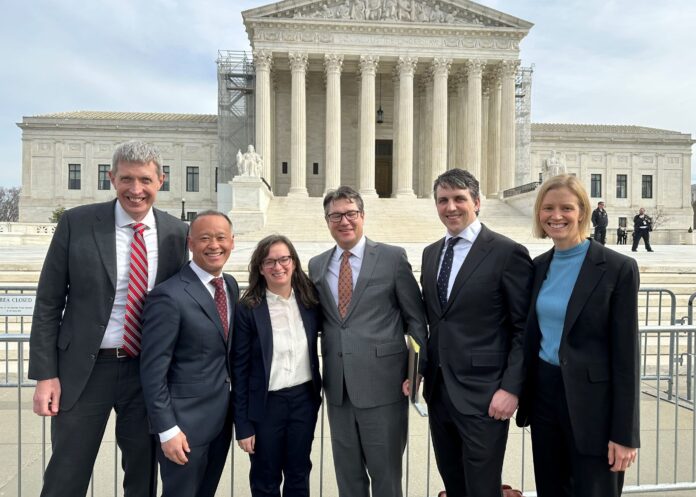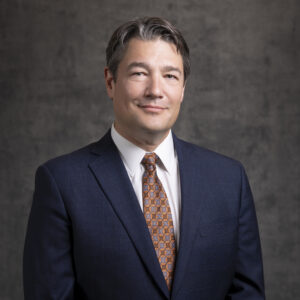
As the members of Olson Grimsley look back on the firm’s first year in business, there’s a lot to see. The firm launched with a roar, becoming involved with the landmark Colorado Supreme Court decision that disqualified former President Donald Trump from the Colorado ballot.
While that case would be overturned by the U.S. Supreme Court, it’s only one of several noteworthy cases the incipient firm has taken on in the past year.
Sean Grimsley, one of the founding partners of the firm, told Law Week that to celebrate the firm’s anniversary, its operations manager, Gabriel Temeyosa, made shirts with the firm’s logo on the front and the phrase “A lot going on at the moment” on the back.
A year before those T-shirts, the firm was founded by attorneys Eric Olson, Grimsley, Kenzo Kawanabe, Abigail Hinchcliff and Jason Murray. Grimsley said that most of the attorneys that founded the firm either knew each other or had worked with each other in the past.
“I think all of us love litigating and trying cases, but we were getting a bit tired of doing so much defense side work,” Grimsley said. “And we wanted to figure out if there was a way to bring our skills together to create a firm that could do good, put simply. That involves public interest work, pro bono work and mostly plaintiff side work.”
The Trump v. Anderson case was brought to the firm by Kawanabe. According to Grimsley, Kawanabe was contacted by the Citizens for Responsibility and Ethics in Washington. He pitched it to his former firm, but they declined to take on the case.
“So he said, ‘Well, we’ve got a bunch of good people starting this new firm,’ and one of the benefits of starting a new firm is you don’t really have the same type of conflicts,” Grimsley said.
While the case was a monumental one, Grimsley noted that it was also a case that the firm took on pro bono. He said the discovery in the case was fairly light, as most of the facts of it were on the public record, but that it required a significant amount of briefing on novel legal issues.

C-SPAN covered the five–day bench trial, and in a quick turn of events, the Colorado Supreme Court ruled in the firm’s favor just a few weeks after.
“Nothing I’ve ever seen has, A, moved that fast, and B, had that many novel legal issues involved,” Grimsley said. “Because as you might imagine, Section Three of the 14th Amendment is not a heavily litigated provision of the Constitution.”
Many of the other cases that the firm has worked on in its first year have been consumer oriented. Grimsley noted that the firm tried the country’s first mass tort case against the makers of premature infant formula. That case, filed against Mead Johnson Nutrition in Illinois, led to a $60 million trial victory for the plaintiffs.
“There are thousands of these cases out there, we tried the first one,” Grimsley said. “That was really in keeping with our values on the consumer protection side.”
The firm was also involved in a $20 million antitrust victory. Olson Grimsley tried a case for Thermal Pipe Shields, which Grimsley described as a small startup insulation company, against Berkshire Hathaway’s Johns Manville. They argued that Johns Mansville was monopolizing the pipe insulation market.
“We want people to call us up when they have a big case that needs to be tried, and that’s exactly what happened in the Thermal Pipe Shields v. Johns Manville case,” Grimsley said. “There was a remand from an appellate decision in the 10th Circuit, and it was going to go to trial on a monopolization claim.”
Since the firm is new, Grimsley said that most of the cases the team has worked on so far have been ones where they’ve been called in, but that’s beginning to change.
Two of the cases the firm is currently working on, one involving the NCAA and another involving the 2022 World Cup, are ones the firm joined at the beginning.
The NCAA case is being brought in Denver, and Grimsley said the firm is representing a former University of Colorado football player against the NCAA and the Power Five conferences.
“It’s an antitrust case brought here in Denver, alleging that the NCAA and Power Five conferences entered into basically a horizontal agreement to prevent college athletes from sharing in TV revenues,” Grimsley said. “And that case has kind of gotten mixed up in the NCAA settlement stuff that’s going on in the Northern District of California right now.”
The other sports-related case involves a labor dispute surrounding the construction of the stadiums for the 2022 World Cup. Olson Grimsley is partnering with Sparacino PLLC, and they’re suing CH2M Hill and Jacobs Solutions.
“We brought a case on behalf of 60-plus Filipino migrant workers under the federal human trafficking statutes, because they were brought over to do the work and immediately had their passports taken from them, and then were forced to live in squalor, essentially for months and years at a time building those stadiums,” Grimsley said.
The suit against CH2M HIll and Jacobs Solutions isn’t the only case they’ve partnered with Sparacino on. They’re also suing Ericsson, a telecommunications company. The suit alleges that the company made protection payments to Al Qaeda and ISIS in Iraq and Afghanistan in the 2000s and 2010s. Grimsley said the intent of the suit was to hold them responsible for some of the terrorist activities conducted by those organizations.
With the suite of cases the firm is trying in public interest law and impact litigation, Grimsley said that the team is often running on the cutting edge of law.
“There’s not a lot of precedent out there,” Grimsley said. “Oftentimes for what you’re doing, you are intentionally and very deliberately trying to move the law in a particular direction. So that’s certainly been a challenge.”
Another challenge the firm has encountered relates to its status as a trial firm. At the time of Law Week’s interview with Grimsley, he said that the jury was out on the firm’s sixth trial in under 13 months.
“These are not short two-day trials, these are anywhere from a week to four weeks long, oftentimes out of state,” Grimsley said. “With our small team, we can get stretched pretty quickly, so that’s been a challenge. But we’ve come through it pretty well, and I don’t think we’d trade it for the alternative.”
Looking forward, Grimsley told Law Week that the firm is going to start trying to take on more cases from the beginning. He didn’t say that the firm was focused on any particular area, but said that the cases moving forward will be aligned with the values of the firm.
Grimsley noted the firm wants a healthy diet of cases that involved trials, as they all enjoy that part of the practice.

